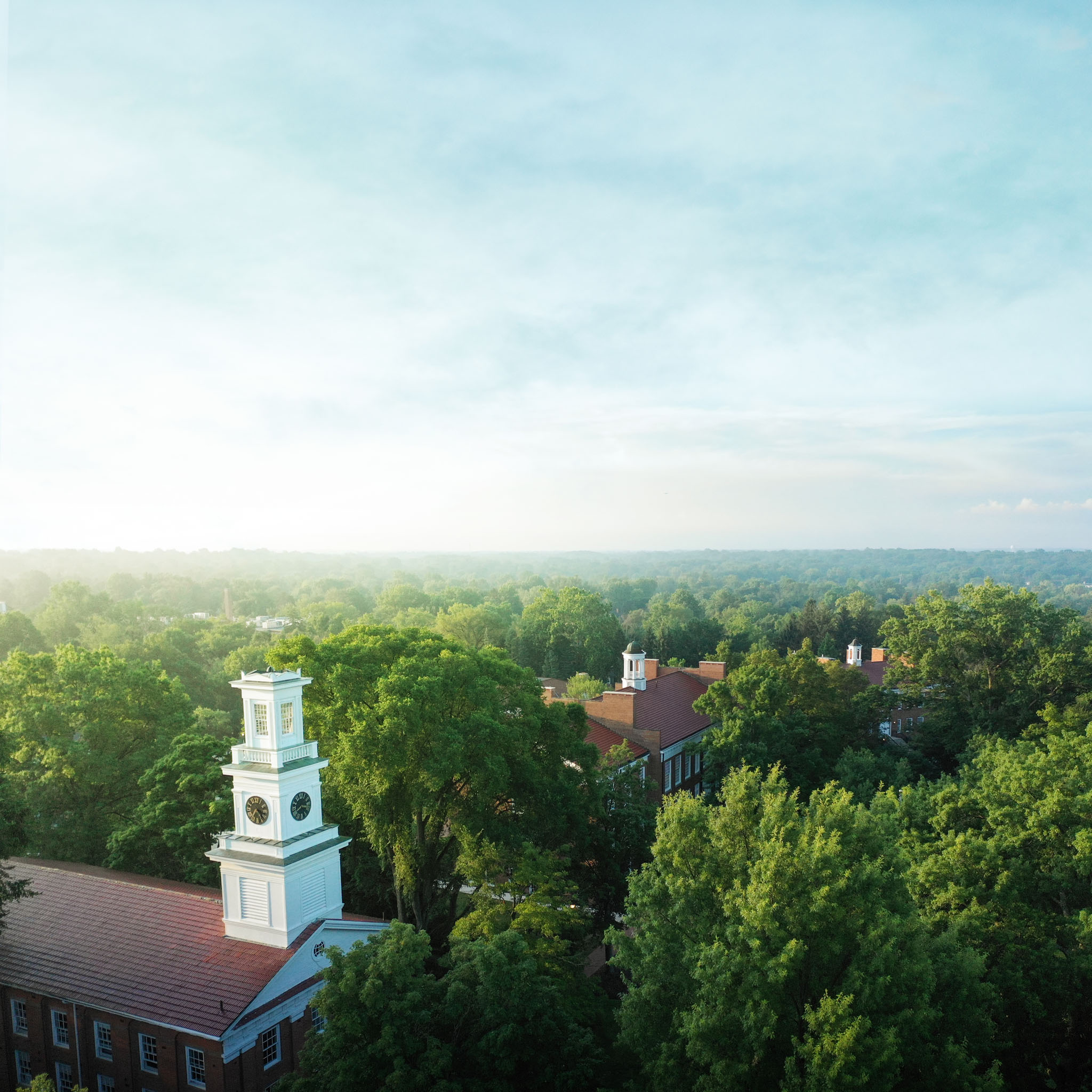At Western Reserve Academy, we often share the benefits of being situated in the charming city of Hudson, Ohio. The historic town is an extension of campus complete with coffee houses, ice cream shops, restaurants and boutiques, welcoming, small-town activities and the comfort and safety of an active, midwestern community. And yet, beyond this cozy bubble is Cleveland, which apart from a theater district that rivals NYC’s, a sprawling park system with endless trails and access to world-class museums and cultural programming, boasts a robust scientific community and renowned healthcare institutions. Our proximity to Cleveland, partnerships with alumni and connections to top-tier scientific professionals affords Western Reserve Academy the ability to offer unique courses, programs, clubs and opportunities in the sciences. Naturally, our students are here for it…and going there because of it.
What began as establishing the after school and MIT-based program BioBuilders at Western Reserve Academy has evolved into leveled courses dedicated to theoretical investigation, research, experimentation, teamwork and publication. The Synthetic Biology program at Western Reserve Academy, taught by the Roush/Wayburn Chair in Environmental Studies Dr. Beth Pethel, delves into the intersection of biology, engineering and innovation. This course culminates with students submitting genetically engineered machine designs for publication and the presentation of their work at an MIT synthetic biology conference.
In short, “students think about a real-world issue and look for ways to solve it by engineering DNA from existing organisms,” Pethel explained. And there is no limit to the problems students set out to solve – preventing fungal infections in bananas at risk of extinction, an alternative to road salt using mealworm protein, tackling plastic waste and the associated environmental impact, producing environmentally friendly sunscreen, remediating algae toxins in nearby Lake Erie and addressing vitamin D deficiencies using bell peppers to name a few!
Pethel marveled at the exceptional growth our Pioneers experience throughout the program. “If students demonstrate an interest and are successful in Biology, Reserve has College Level scientific offerings not found at many high schools including Synthetic Biology and Microbiology,” she said. “CL Synthetic Biology I is more theoretical. Students come up with ideas, theoretically develop a design. CL Synthetic Biology II students are afforded a lot of lab time to build out their project, research and collaborate.” Pethel laughed that students are surprised at the amount of writing required. Despite the complexity and sophistication often associated with scientific writing, Pethel encourages students to create visual diagrams and videos to complement their publications. “This improves engagement and supports understanding.”
For students interested in exploring the sciences, the biggest challenge might just be finding room in their schedules to take all the classes offered at Reserve. Carmen Reed ’24 was drawn to WRA for Cancer Immunology and was encouraged to explore Synthetic Biology after friends shared their own positive experiences. Afternoon opportunities allow Reed to do it all. “I joined the afternoon [BioBuilders] team in the spring and contributed to the paper published in the high school synthetic biology journal BioTreks. In creating a website for the program, I learned about the projects generated by CL SynBio I and II students,” Reed said about the website she built to accompany the Synthetic Biology program. “The creativity – and the broad range of problems biology can fix – fascinated me, and I can’t wait to see what this year’s students come up with!” Reed has taken classes in Cancer Immunology, Microbiology and participates in the BioBuilders afternoon program. “I can easily transfer the skills learned in science classes to my future learning experiences,” she shared. “My experience with project design and experiments boosts my confidence as an independent learner and prepares me to take on projects and procedures in any discipline; my experience with scientific writing helps me with other academic writing. The inconspicuous aspects of research prepared me the most for my future education and career.” Isabella Haslinger Johnson ’25 conveyed similar sentiments. “WRA’s Synthetic Biology program has been an incredible part of my science experience at Reserve.” Like the majority of individuals, Johnson didn’t know very much about synthetic biology before coming to Reserve. “I learned so much during my first year and really loved the topics. I’ve helped to design two projects so far, and the papers were published in Biotreks, a peer-reviewed high school journal. Having the opportunity to work on those projects and to write, edit, and publish papers has been a valuable experience.” And thanks to Cavin Xue '24 and his Compass project BioBlab, curious individuals can keep up with student scientific discoveries! Xue maintains the news-based blog, which covers WRA research projects in Cancer Immunology, Synthetic Biology and other scientific disciplines.
Possibly the most captivating aspect of scientific investigation in general is the dynamic nature of the discipline. Courses of study at Reserve are nimble, continuously evolving in tandem with the field itself. Susan & John ’63 Steen Chair for Science and Mathematics and Science Faculty Member Dr. Robert Aguilar should know. During his doctoral studies, Aguilar concentrated his research on the immunotherapy benefits of vaccines on certain types of cancers with the late Vincent Tuohy, Aguilar’s longtime mentor at the Cleveland Clinic. And this year, a team of students is continuing this promising research!
Cancer Immunology I, II, Advanced and CL courses allow students to explore biotechnology methods, including cell culture, protein purification, and CRISPR gene editing, as well as the opportunity to collaborate with the Cleveland Clinic on cancer vaccine research. “Students begin by choosing a cancer they are interested in,” Aguilar explained. “We then either develop a project from scratch or they might take up a project that was left behind by a graduate that needs more research.”
From the outside looking in, the lab, with equipment that rivals what’s found in Cleveland’s world-class healthcare institutions, can appear intimidating. Especially to budding researchers. William Bartlett ’24 shared: “[As a freshman] the array of equipment and the complexity of the research seemed beyond my grasp. However, under the exceptional mentorship of Dr. Aguilar, whose patience, brilliance and drive were truly inspiring, I gradually found my footing. His guidance was instrumental in my transformation from a novice, overwhelmed by the lab’s intricacies, to a competent researcher.” Carmen Reed was struck by the format of the class. “The [Cancer Immunology] class structure taught me the most. The class strays from the traditional definition, very independently designed; Dr. Aguilar provides us with detailed procedures and answers questions, but otherwise allows us to discover the methods on our own or from other classmates,” she explained. “I found this daunting at first, but learned to appreciate the structure and how it prepares us to become independent researchers beyond Reserve. Every student in that class, especially those in Advanced or CL Cancer, is always there to help another out, demonstrating a technique or explaining a procedure.”
William Bartlett’s curiosity led him to apply for Reserve’s elite summer experience at Baylor College of Medicine made possible by Reserve graduate and President of Baylor College of Medicine Dr. Paul Klotman ’68. “Each day was filled with new learning opportunities, ranging from understanding medical ethics to mastering patient care techniques, and even practical skills like suturing,” Bartlett said. “My most valuable take away from my time at Baylor College of Medicine was the incredible sense of community and support within the medical field, coupled with the rich diversity of its professionals. Meeting and talking with physicians from various backgrounds, I learned that regardless of one's role, each person contributes significantly to patient care and makes a real impact. This blend of diverse perspectives and unified commitment to making a difference was truly inspiring. It showed me a community where everyone, from surgeons to nurses, supports each other with a common goal of helping others.” Stephen Kosco ’24, who also attended Baylor, credits Wanda Boesch, Dean of Academic Affairs, for recommending him to the program. Kosco shared that Baylor went beyond just medicine. “Yes we sat in on lectures and I learned how to suture, tie surgical knots, and more but that was also the first time being away from home in a completely different state.” Baylor not only demanded a new level of independence, the program also introduced Kosco to the prosthetics industry, which is an avenue he plans to explore in the future.
Carter Fleming ’24 shared his journey through the sciences. “My first year [in Cancer Immunology], I learned how to take care of bacterial cells. I learned about extracting their DNA,” Fleming began. This experience directly translated into the handling of donated cancer cells from the Cleveland Clinic. “I learned how to thaw, feed, store and split [cells] between two flasks, a process called subculturing.” Now Fleming, with his lab partner Bartlett, are diving into their own promising research, which will be presented at the Annual Meeting of the American Association of Immunologists in May of 2024. “Our data alone is crucial to discovering a cause of or possible solutions to breast cancer in humans. If our research gets accepted, we will move on to present our discoveries in front of college students, professionals and other researchers who will also be presenting their work in the field.”
It’s hard not to get excited about what our students are accomplishing…during high school! Both Dr. Pethel and Dr. Aguilar agreed that many students whose goal was to work toward College Level science courses at Reserve, continue in that direction post high school. “Students may have no interest in the biological sciences,” Pethel said, “and [after taking Synthetic Biology] find that they are now considering a path in bioengineering! Students are empowered to explore, investigate and either rule out or spark further interest,” she said. Aguilar confirmed. “I know of some students who are currently in medical school or have graduated and are now physicians. Others have gone into research. For some, they soon find out that this is not what they want to do yet walk away with some great life skills.” Aguilar forwarded a message from graduate Maddy Hadrys ’23 who shared, “I can’t help but reminisce on the amazing resources WRA provided. Cancer Immunology was of the utmost importance to me. While looking at internships over the summer, the Cancer-Focused Summer Undergraduate Research (CanSUR) at Case Western Reserve University really interests me.”
Of course biology and immunology only scratch the surface of Reserve’s College Level scientific offerings. In CL Physics, students combine high level conceptual framework with rigorous mathematical tools to dive into independent projects, often with a personal connection to their own life: a dancer studying how body and foot positioning provide torque and impact the inertia of a dancer in the midst of a Fouette turn, or curious individuals collecting data at bowling alleys to investigate the spin of a bowling ball or diving into the science behind a Van de Graff generator and building one! In CL Chemistry students not only focus in on equilibrium, but also art, as they investigate LeChatelier's Principle and wind up with a rainbow of colors! The unifying theme across all programs is curiosity. And at Reserve, there’s an endless supply.
The success of any academic program hinges on the effectiveness of its instructors. And at Western Reserve Academy, we have the best. Just ask the students. “It is truly a privilege to have these experiences as a sophomore - senior in high school,” Carmen Reed said. “I am so grateful to the people who make it possible, like Dr. Aguilar and Dr. Pethel, the donors and other supporters of Reserve’s science programs!” Although Stephen Kosco can’t pick a favorite (no Reserve student can!), he feels fortunate to have been taught by Wanda Boesch. “Even though Honors Physics was the hardest class I’ve ever taken, Mrs. Boesch made the entire experience.” Mariana Ma ’24 credits her Synthetic Biology project and the support provided by Dr. Pethel with her decision to major in bio/environmental science in the future. Because of “the programs at Reserve and my synbio project, I will further explore my interest in science and biology,” she said. “Dr. Aguilar is more than just a teacher,” William Bartlett shared. “He is a professional in his field, whose brilliance and depth of knowledge in Cancer Immunology are truly awe-inspiring. Learning from him, I've come to realize what it means to be taught by one of the best.”
Attend any Reserve Reunion Weekend and you’ll hear WRA alums consistently speak of masters of the past, teachers who transformed their high school experiences and will go down in Reserve history. How lucky we are too, to have Reserve greats of today – educators so committed to the shaping of young minds, encouraging unique thought and shepherding empowered leaders into a more brilliant tomorrow, including solutions to problems, cures for diseases, and care for humans and our planet.
Stay tuned as we continue to highlight Reserve's competitive programs in all areas of academic study!





















